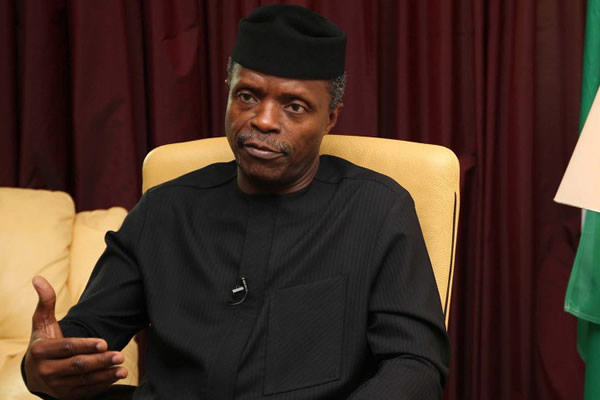The Federal Government has christened the 2017 Budget which was signed into law on Monday by Acting President Yemi Osinbajo as “Budget of Economic Recovery and Growth”.
Osinbajo said the name reflected the commitment of the administration to ensure strong linkage between the medium-term Economic Recovery and Growth Plan (ERGP) recently launched by President Muhammadu Buhari and the annual budgets.
According to him, it is designed to bring the Nigerian economy out of recession unto a path of sustainable and inclusive growth.
“The budget has a revenue projection of N5.08 trillion and an aggregate expenditure of N7.44 trillion.
“The projected fiscal deficit of N2.36 trillion is to be financed largely by borrowing,’’ Osinbajo said.
He assured those who had expressed concern about the growing public debt that “we are taking several actions to grow government revenues as well as plug revenue leakages.
“This is because, notwithstanding the fact that our borrowings are still within sustainability limits, we are determined, in the medium term, to reduce our reliance on borrowings to finance our expenditures’’.
The acting president noted that the economy was already signaling a gradual recovery as growth was headed towards positive territory.
He said that the first quarter GDP estimated at -0.52 per cent compared favourably with -2.06 per cent in the first quarter of 2016.
He also said that inflation was declining to 17.24 per cent from 18.74 per cent as at May 2016.
Osinbajo also observed that the country’s external reserves rose to US$30.28 billion as at June 8, 2017 from US$26.59 billion as at May 31, 2016.
“We are also gradually instilling confidence in our exchange rate regime.
“This improvement in GDP growth and other macro-economic indicators is largely attributable to our strategic implementation of the 2016 Budget as well as stronger macroeconomic management and policy coordination.’’
The acting president also expressed confidence that the 2017 Budget would deliver positive economic growth and prosperity “that is self-sustaining and inclusive’’.
Accordingly, he said that the 2017 budget will be implemented in line with the administration’s Economic Recovery and Growth Plan.
He said that over the 2017-2020 plan period “we are focusing on five key execution priorities”, namely: stabilising the macroeconomic environment; agriculture and food security; energy sufficiency in power and petroleum products.
He also mentioned improved transportation infrastructure and industrialisation through support for micro, small and medium-scale enterprises (MSMEs).
“The 2017 budget includes provisions that reflect these priorities.
“To demonstrate our commitment to following through our Economic Recovery and Growth Plan, the 2017 budget allocates over N2 trillion to capital expenditure, principally infrastructure.
“We are committing over N200 billion to improve transport infrastructure such as roads and rail; over N500 billion for investments in works, power, and housing.
“And N46 billion is for Special Economic Zone Projects to be set up in each geopolitical zone,’’ he added. (NAN)
DCU/MST

